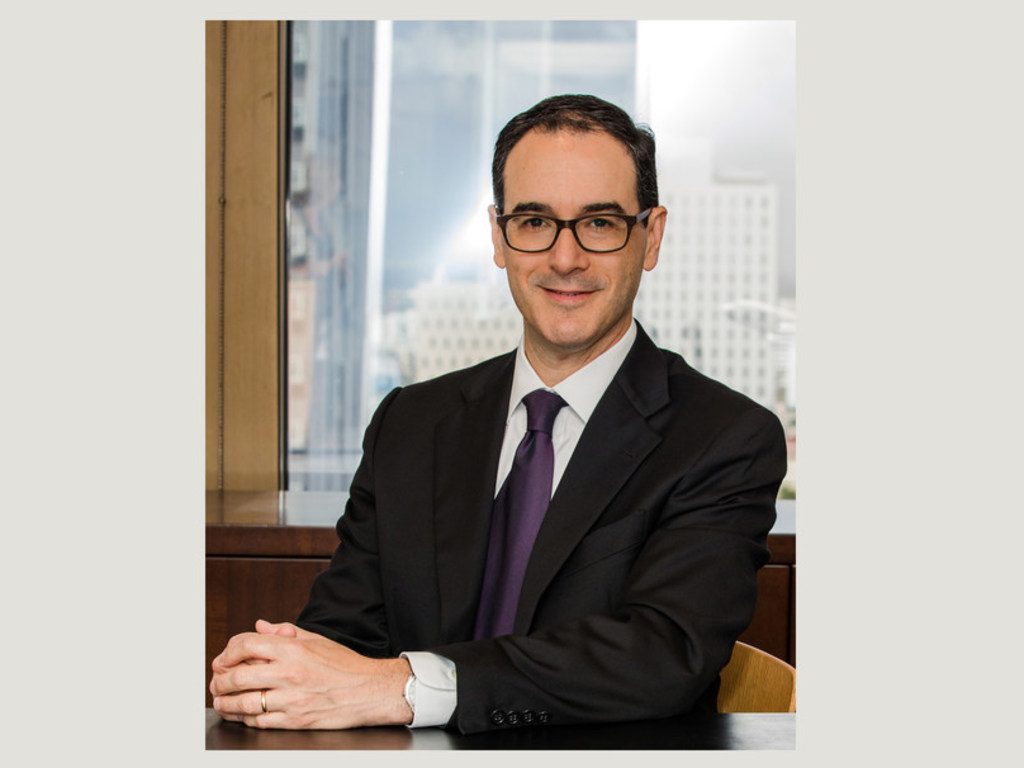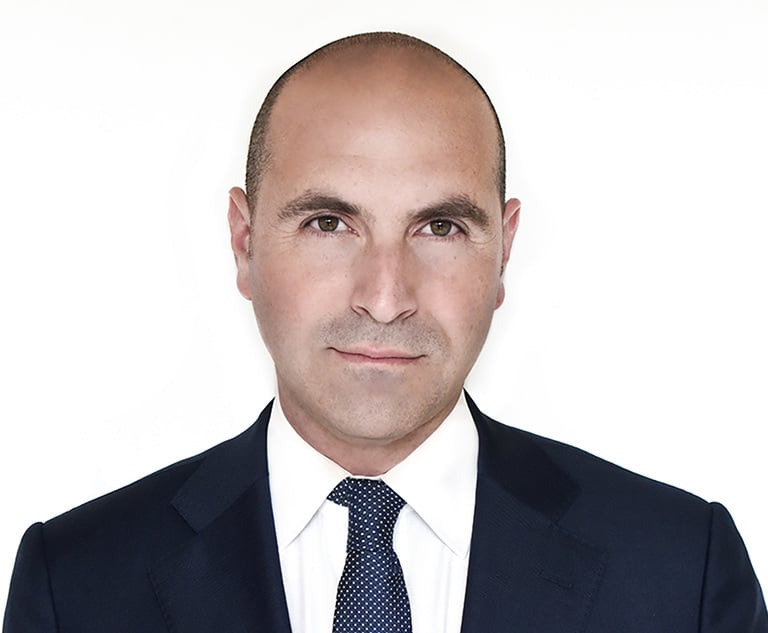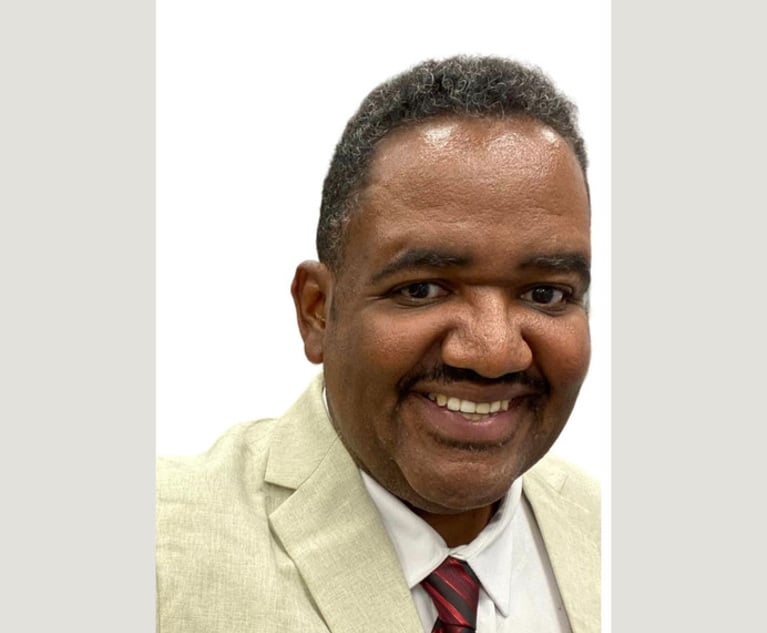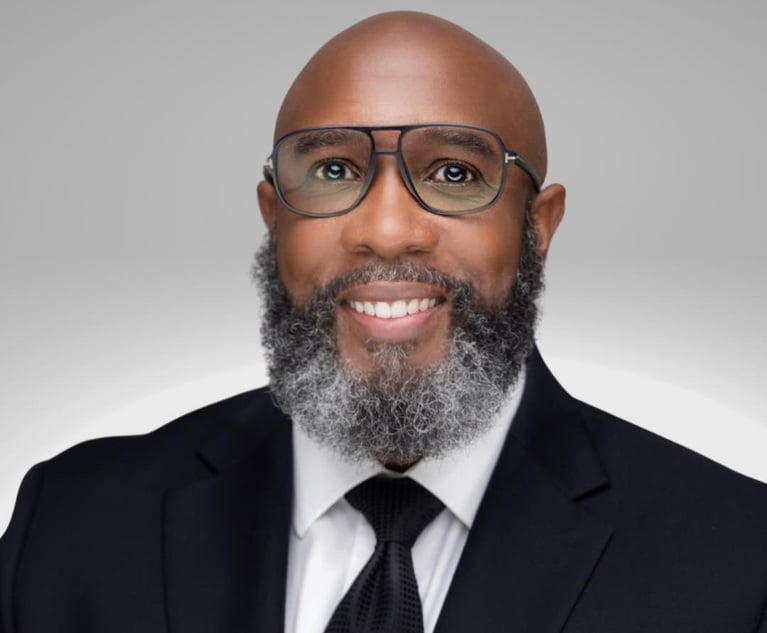Stephen Rosenthal Channels His Strong Work Ethic into Parkland Litigation
The Podhurst Orseck partner is representing the families of victims of the February 2018 mass shooting at Marjory Stoneman Douglas High School in several lawsuits.
November 01, 2019 at 01:11 PM
8 minute read
 Podhurst Orseck partner Stephen F. Rosenthal. Courtesy photo
Podhurst Orseck partner Stephen F. Rosenthal. Courtesy photo
Stephen Rosenthal is the rare jack-of-all-trades who might actually be the master of them all.
Long before he moved to Miami and joined Podhurst Orseck, the bespectacled attorney earned his initial legal bona fides clerking for U.S. District Judge Mark L. Wolfe and retired federal judge Rosemary Barkett. He subsequently worked as a trial attorney for the federal programs branch of the U.S. Department of Justice, and called upon his education in constitutional law to defend federal initiatives from legal challenges.
Although Podhurst Orseck is the only law practice you'll find on Rosenthal's resume, it'd be presumptuous to assume he's grown comfortable or settled into a conventional routine. Since joining the firm as an associate in 2001, he's tackled an intimidating variety of practice areas. On top of operating as a trial attorney and representing clients in everything from personal injury and wrongful death cases to aviation litigation, Rosenthal also works as an appellate lawyer. Somehow, he also manages to dedicate time toward pet causes, such as addressing gun violence and election litigation.
"I tend to be a workaholic," Rosenthal admitted. The Podhurst Orseck partner has no illusions about his workload, and is fully aware he bites off more than the average lawyer — nay, human being — might be willing to chew. A sign gifted to him by Mindy Zane Rosenthal, his wife of 24 years, says, "Never get so busy making a living that you forget to make a life."
The placard now hangs in Rosenthal's downtown Miami office, although he points out it's placed behind a door and often winds up obscured.
"I've worked on vacations, and that's one of the prices you pay sometimes for having said yes to a case," Rosenthal said, adding he's wound up writing briefs in ski lodges and hotels all around the world. The lawyer called the sign his "little reminder" to stay tethered to the parts of his life that fall outside the purview of courtrooms and office settings.
"By nature I work a lot," he said. "I enjoy the work, but I also always tell young lawyers and people who are thinking about going to law school that you cannot be good at this profession without working hard. You might get lucky or get a pass once or twice, but the minute that you think that you can stop working hard is the time when your reputation will suffer, and you won't represent your client as well as you can."
Rosenthal's dogged approach to his trade seems to have worked out favorably for him and his clients thus far. The litigator's esteemed track record and reputation has led to his involvement in a number of notable cases, including the multidistrict litigation concerning Takata airbags and the concussion lawsuits brought by football players against the NFL. He's currently defending NBCUniversal Telemundo in a defamation case, and representing the families of victims of the February 2018 mass shooting at Marjory Stoneman Douglas High School in multiple lawsuits. One of the cases is currently awaiting a decision from the Florida Supreme Court, and could have a major ripple effect on liability cases brought against state agencies and municipalities.
"What it boils down to is whether the events on that day constituted one or multiple incidences or occurrences," Rosenthal says. He's representing several Parkland victims' families in a legal action against the Broward School Board. Officials have argued shooter Nikolas Cruz's attack on Stoneman Douglas constituted a single incident, which would mean the school board's potential liability would be capped at $300,000 under the Florida Statute waiving sovereign immunity. While the state law places a $300,000 cap on suits arising from the same occurrence, individual wrongful death and personal injury lawsuits are capped at $200,000.
Rosenthal argued on his clients' behalf that the deaths and injuries caused by the shooting represented separate instances, which would mean each family could potentially receive as much as $200,000 from their respective claims. If the high court rules against them and in favor of the Broward School Board, any theoretical awards proffered by the state agency would pull from the $300,000 limit outlined by state law.
"It has huge, wide ramifications because it's not just mass shootings necessarily. It could be any circumstance that involves multiple victims," Rosenthal said. "In my personal view, the legislature made it clear enough that it should actually be regarded as different occurrences every time somebody shoots somebody else [in a mass shooting.] We address that in detail in the argument. I think it's an issue for the legislature to fix."
'Most extreme statute'
Rosenthal is also providing legal counsel to the parents of Jaime Guttenberg in a lawsuit against American Outdoor Brands, the parent company of Smith & Wesson and the manufacturer of the AR-15 assault rifle allegedly used by Cruz in the Parkland shooting. The suit also names Sunrise Tactical Supply — the store that purportedly sold Cruz the gun — as a defendant, and seeks to confront a Florida law that Rosenthal contends was drafted to deter state and local governments from litigating against the firearms industry.
"Our clients wanted to sue the gun industry, because they feel like putting out these weapons of war into civilian use just can't be right, and there should be some accountability for it," he said. Rosenthal said he discovered the law while researching how his clients could pursue litigation against the gun manufacturer.
"It is the most extreme statute I've ever seen," he said, adding the 2001 law was likely written with input from the National Rifle Association. "It basically says you can't sue a gun manufacturer. If you do, you automatically lose, and the court must sanction you with not just attorney's fees for the gun manufacturer and costs, but also any damages that they may incur as a result of your having filed suit. So that certainly makes a private person sit up and say, 'Wait a second. Can I even sue them? Because this is saying that I automatically lose, and I'm going to have to pay all their lawyers' fees and any money that they lose.'"
The complaint is seeking a declaratory judgment that would declare the law does not prevent private parties from suing gun manufacturers. Rosenthal said the statute's legislative history supports his clients' good-faith basis for the suit.
"It's pretty clear it was designed to prevent governments from suing gun manufacturers," he said, noting the law was passed just as Miami-Dade County was seeking to force firearms companies into compensating gun-violence victims for their health costs.
"If we can succeed in that suit and get a declaration from the courts that this does not restrict private parties from suing, that's a small victory," Rosenthal said. "Then we can go forward with the actual substantive damages claims and injunctive relief claims that we want to bring against the gun manufacturers, and then we face another federal statute that makes it really hard to sue gun manufacturers. So it's a real uphill battle."
Rosenthal said the opportunity to tackle challenges, issues and injustices posed by cases like the Parkland lawsuits is what's kept him enthralled with the legal profession.
"That's why I went to law school—to try to really make a difference for people," he said. "Some of the most satisfying cases are ones where you have a client who's a great person, got a raw deal in life, and it was something that was the result of somebody else's negligence. And had they done things properly … this person would not have lost a husband or a child. And you can't bring those people back, but you can at least use the legal system to bring them some measure of justice."
Stephen F. Rosenthal
Born: April 1970, New York City
Spouse: Mindy Zane Rosenthal
Children: Benjamin, Emma
Education: Harvard Law School, J.D., 1996; University of Sussex (U.K.), 1993; Harvard College, B.A., 1992
Experience: Partner, Podhurst Orseck, 2005-present; Associate, Podhurst Orseck, 2001-2005; Trial Attorney, U.S. Department of Justice, Civil Division, Federal Programs Branch, 1999-2001; Law Clerk to Hon. Rosemary Barkett, U.S. Court of Appeals for the Eleventh Circuit, 1997-1998; Intern, U.S. Attorney's Office for the Southern District of Florida, Fall 1997; Law Clerk to Hon. Mark Wolf, U.S. District Court, District of Massachusetts, 1996-1997
More attorney profiles:
'I am Broken in Some Ways': Miami Lawyer Turned Struggle into Success
'Never Busier': Ronald Kammer Traces the Evolution of Florida Insurance Litigation
Attorney Luis Salazar Looks to the Future of His Law Office and Practice
This content has been archived. It is available through our partners, LexisNexis® and Bloomberg Law.
To view this content, please continue to their sites.
Not a Lexis Subscriber?
Subscribe Now
Not a Bloomberg Law Subscriber?
Subscribe Now
NOT FOR REPRINT
© 2025 ALM Global, LLC, All Rights Reserved. Request academic re-use from www.copyright.com. All other uses, submit a request to [email protected]. For more information visit Asset & Logo Licensing.
You Might Like
View All
Growing Referral Network, Alternative Fees Have This Ex-Big Law’s Atty’s Bankruptcy Practice Soaring
5 minute read
Against the Odds: Voters Elect Woody Clermont to the Broward Judicial Bench
4 minute read
Miami Civil Judge Myriam Lehr to Say Goodbye to the County Court Bench
4 minute readTrending Stories
- 1Veritext Legal Solutions Announces the Past Acquisitions of Three Alternative Dispute Resolution Firms
- 2Sarno da Costa D’Aniello Maceri LLC Announces Addition of New Office in Eatontown, NJ, and Named Partner
- 3LSU General Counsel Quits Amid Fracas Over First Amendment Rights of Law Professor
- 4An Eye on ‘De-Risking’: Chewing on Hot Topics in Litigation Funding With Jeffery Lula of GLS Capital
- 5Arguing Class Actions: With Friends Like These...
Who Got The Work
J. Brugh Lower of Gibbons has entered an appearance for industrial equipment supplier Devco Corporation in a pending trademark infringement lawsuit. The suit, accusing the defendant of selling knock-off Graco products, was filed Dec. 18 in New Jersey District Court by Rivkin Radler on behalf of Graco Inc. and Graco Minnesota. The case, assigned to U.S. District Judge Zahid N. Quraishi, is 3:24-cv-11294, Graco Inc. et al v. Devco Corporation.
Who Got The Work
Rebecca Maller-Stein and Kent A. Yalowitz of Arnold & Porter Kaye Scholer have entered their appearances for Hanaco Venture Capital and its executives, Lior Prosor and David Frankel, in a pending securities lawsuit. The action, filed on Dec. 24 in New York Southern District Court by Zell, Aron & Co. on behalf of Goldeneye Advisors, accuses the defendants of negligently and fraudulently managing the plaintiff's $1 million investment. The case, assigned to U.S. District Judge Vernon S. Broderick, is 1:24-cv-09918, Goldeneye Advisors, LLC v. Hanaco Venture Capital, Ltd. et al.
Who Got The Work
Attorneys from A&O Shearman has stepped in as defense counsel for Toronto-Dominion Bank and other defendants in a pending securities class action. The suit, filed Dec. 11 in New York Southern District Court by Bleichmar Fonti & Auld, accuses the defendants of concealing the bank's 'pervasive' deficiencies in regards to its compliance with the Bank Secrecy Act and the quality of its anti-money laundering controls. The case, assigned to U.S. District Judge Arun Subramanian, is 1:24-cv-09445, Gonzalez v. The Toronto-Dominion Bank et al.
Who Got The Work
Crown Castle International, a Pennsylvania company providing shared communications infrastructure, has turned to Luke D. Wolf of Gordon Rees Scully Mansukhani to fend off a pending breach-of-contract lawsuit. The court action, filed Nov. 25 in Michigan Eastern District Court by Hooper Hathaway PC on behalf of The Town Residences LLC, accuses Crown Castle of failing to transfer approximately $30,000 in utility payments from T-Mobile in breach of a roof-top lease and assignment agreement. The case, assigned to U.S. District Judge Susan K. Declercq, is 2:24-cv-13131, The Town Residences LLC v. T-Mobile US, Inc. et al.
Who Got The Work
Wilfred P. Coronato and Daniel M. Schwartz of McCarter & English have stepped in as defense counsel to Electrolux Home Products Inc. in a pending product liability lawsuit. The court action, filed Nov. 26 in New York Eastern District Court by Poulos Lopiccolo PC and Nagel Rice LLP on behalf of David Stern, alleges that the defendant's refrigerators’ drawers and shelving repeatedly break and fall apart within months after purchase. The case, assigned to U.S. District Judge Joan M. Azrack, is 2:24-cv-08204, Stern v. Electrolux Home Products, Inc.
Featured Firms
Law Offices of Gary Martin Hays & Associates, P.C.
(470) 294-1674
Law Offices of Mark E. Salomone
(857) 444-6468
Smith & Hassler
(713) 739-1250







